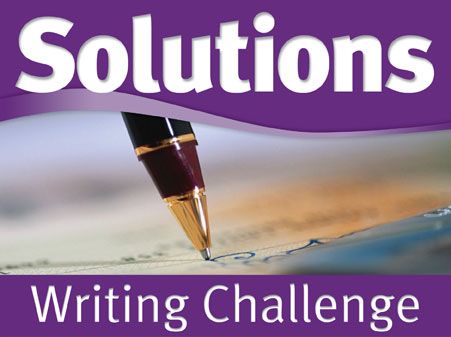 Freelance teacher trainer, Olha Madylus, looks at some of the issues related to improving students’ writing skills ahead of her upcoming webinar on Solutions Writing Challenge #1: “My students keep making the same mistakes”.
Freelance teacher trainer, Olha Madylus, looks at some of the issues related to improving students’ writing skills ahead of her upcoming webinar on Solutions Writing Challenge #1: “My students keep making the same mistakes”.
Many teachers voice concerns about their students’ inability to improve their writing and learn from their mistakes. Why is it so difficult to improve? Is it the approach we take to writing? We don’t like to write in our own language so why would our students want to write in English?
There are a number of ways to help students overcome their difficulties. Students jump very quickly from producing short texts, which are often written in order to practise a particular grammar item, to writing compositions which require a lot more than simply getting the ‘grammar right’ to be successful. They need to consider how to address the composition title, come up with arguments and ideas, use rich vocabulary, structure the text appropriately and even be imaginative.
So, it’s a good idea for writing tasks to be ‘scaffolded’. This is a term we use a lot with early years’ language learning. ‘Scaffolding’ means that tasks include a lot of support so that learners aren’t overwhelmed and can be successful. Gradually the support is withdrawn as students’ ability and confidence increases. It’s like teaching a child to swim: once they are ready, you take away your hands from under their tummy and off they go alone. Within scaffolded tasks learners can still be allowed enough freedom for their imagination and creativity, which adds to motivating them to write.
Writing is a process and teachers can help their students by focussing on different parts of that process individually. Tasks can focus on various sub-skills, as teachers help their students improve the communication, the language, even the register of their writing.
Teachers can also drive their students toward success by taking a more positive approach to marking writing tasks. Getting back your homework covered in red ink and negative comments is very demoralising. Success is a key element in the classroom. If learners, particularly teens, whose egos are quick to bruise, feel they are failing at something, they tend to avoid it and rather than making more effort, make less or none at all.
We should also reflect on where students do their writing. Much is done at home, but teachers can also encourage their students to collaborate when they write. Working in pairs or small groups encourages learning writing skills to take place and not just testing these skills.
Register for Olha Madylus’s webinar ‘Solutions Writing Challenge #1: Solutions to mistakes’ on either Tuesday 24th or Thursday 26th February to explore this challenge further.


In my view, writing is the most difficult skill.
Thank you for an excellent article.
Reblogged this on Halina's Thoughts and commented:
There are a number of ways to help students overcome their difficulties. Students jump very quickly from producing short texts, which are often written in order to practise a particular grammar item, to writing compositions which require a lot more than simply getting the ‘grammar right’ to be successful. They need to consider how to address the composition title, come up with arguments and ideas, use rich vocabulary, structure the text appropriately and even be imaginative.